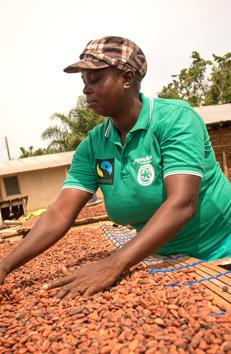
Our decisions in what to buy are based on taste, quality and price. But what you might not know is that the decisions we make can have a significant impact. Fairtrade products vastly improve the working and living conditions of families in developing countries. But how does Fairtrade work? Let’s see!
Improving the life of people in developing countries
Fairtrade is a simple way to make a difference in the lives of people who grow our food.
This international organization works every day to improve the conditions of workers and their families in developing countries such as South Africa and South America. By supporting Fairtrade, we help give to these people the tools to become independent in a trade which traditionally discriminates against the poorest and weakest producers.
Impacting women’s lives
Gender inequality is still present in farming communities around the world: this phenomenon is particularly spread in agriculture, where women farmers have less access than men to resources like land, information, training and supplies. Fairtrade’s gender strategy re-balance power structures and relationships between people of different genders, by strengthening women’s human, social, financial and physical value. For example, the Women’s School of Leadership in Côte d’Ivoire, gives to women of cocoa producing communities the opportunity to gain skills in finance, negotiation and decision-making.
Improving the working condition
Workers in developing world often have a lack of formal contracts, freedom of association, basic health and safety precautions, together with low wages. Fairtrade ensures that workers receive a fairer share of the economic benefits. It also provides employment conditions that include wages, social security and formal contracts to guarantee that they have autonomy and adequate training. It also encourages workers’ participation across all aspects of a business, by promoting collaboration between employees and managers based on mutual trust, respect and dialogue.
Reducing child labor
Child labor is a common phenomenon spread all over the world, driven by poverty. These children are not able to attend school, play or receive proper nutrition and care. Many of them work under dangerous and harmful conditions, and often they are victims of slavery, trafficking or forced labor.
Fairtrade collaborates with children, youth and community members to support agricultural communities in advancing child rights and safety, choosing to work in products (like cotton and cocoa) and countries with high risk of child labor, where people are most in difficulty.
Fairtrade provides the farmers involved in production the adequate livelihoods, which allow them not to use child labor. It also guarantees an immediate remedy and long-term wellbeing for the child, solves existing problems and ensures that they don’t happen again.
Protecting the environment
When producers are certified as Fairtrade, they engage to environmental standards that protect the local ecosystem. Farmers must ensure minimized and safe use of chemical products, a correct waste and water management, and no use of OGM seeds. They support local biodiversity through ecologically sensitive areas and are prohibited from cutting down primary forest for cultivation. Fairtrade also encourages farmers by offering a higher Fairtrade Premium (sum of money received in addition to the minimum remuneration, that farmers decide how to invest) to those who choose to become eco-friendly.

P U T I N P L A C E: COCOA PRODUCTION
Cocoa business is a deal: it is worth £4 billion every year only in the UK.
The problem is that farmers are at the end of the supply chain, and they see very little of the cocoa’s value: in Cote d’Ivoire, they earn less than $1 per day.
Fairtrade cocoa farmers don’t work alone: they are members of cooperatives and organized democratically. The central component of the Fairtrade system is the minimum price, which is the minimum that farmers organizations are paid when selling their products through Fairtrade.
Additionally, producers’ organizations receive the Fairtrade premium. It is up to the farmers and workers to decide how to use the premium: they might build schools, water pumps, warehouses, invest in trucks for cocoa beans, training support and diversification in production.
Having a stable income can drastically improve whole families’ opportunities.
